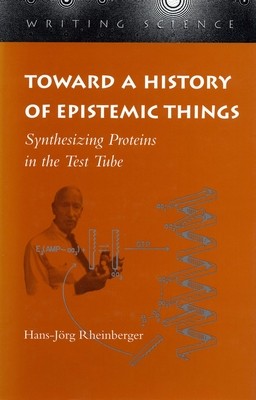
- We will send in 10–14 business days.
- Author: Hans-Jörg Rheinberger
- Publisher: Stanford University Press
- ISBN-10: 0804727864
- ISBN-13: 9780804727860
- Format: 15.3 x 22.9 x 2 cm, minkšti viršeliai
- Language: English
- SAVE -10% with code: EXTRA
Reviews
Description
In this powerful work of conceptual and analytical originality, the author argues for the primacy of the material arrangements of the laboratory in the dynamics of modern molecular biology. In a post-Kuhnian move away from the hegemony of theory, he develops a new epistemology of experimentation in which research is treated as a process for producing epistemic things.
A central concern of the book is the basic question of how novelty is generated in the empirical sciences. In addressing this question, the author brings French poststructuralist thinking--notably Jacques Derrida's concepts of "différance" and "historiality"--to bear on the construction of epistemic things. Historiographical perspective shifts from the actors' minds to their objects of manipulation.
These epistemological and historical issues are illuminated in a detailed case study of a particular laboratory, that of the oncologist and biochemist Paul C. Zamecnik and his colleagues, located in a specific setting--the Collis P. Huntington Memorial Hospital of Harvard University at the Massachusetts General Hospital of Boston. The author traces how, between 1945 and 1965, this group developed an experimental system for synthesizing proteins in the test tube that put Zamecnik's research team at the forefront of those who led biochemistry into the era of molecular biology.
EXTRA 10 % discount with code: EXTRA
The promotion ends in 22d.02:28:15
The discount code is valid when purchasing from 10 €. Discounts do not stack.
- Author: Hans-Jörg Rheinberger
- Publisher: Stanford University Press
- ISBN-10: 0804727864
- ISBN-13: 9780804727860
- Format: 15.3 x 22.9 x 2 cm, minkšti viršeliai
- Language: English English
In this powerful work of conceptual and analytical originality, the author argues for the primacy of the material arrangements of the laboratory in the dynamics of modern molecular biology. In a post-Kuhnian move away from the hegemony of theory, he develops a new epistemology of experimentation in which research is treated as a process for producing epistemic things.
A central concern of the book is the basic question of how novelty is generated in the empirical sciences. In addressing this question, the author brings French poststructuralist thinking--notably Jacques Derrida's concepts of "différance" and "historiality"--to bear on the construction of epistemic things. Historiographical perspective shifts from the actors' minds to their objects of manipulation.
These epistemological and historical issues are illuminated in a detailed case study of a particular laboratory, that of the oncologist and biochemist Paul C. Zamecnik and his colleagues, located in a specific setting--the Collis P. Huntington Memorial Hospital of Harvard University at the Massachusetts General Hospital of Boston. The author traces how, between 1945 and 1965, this group developed an experimental system for synthesizing proteins in the test tube that put Zamecnik's research team at the forefront of those who led biochemistry into the era of molecular biology.


Reviews